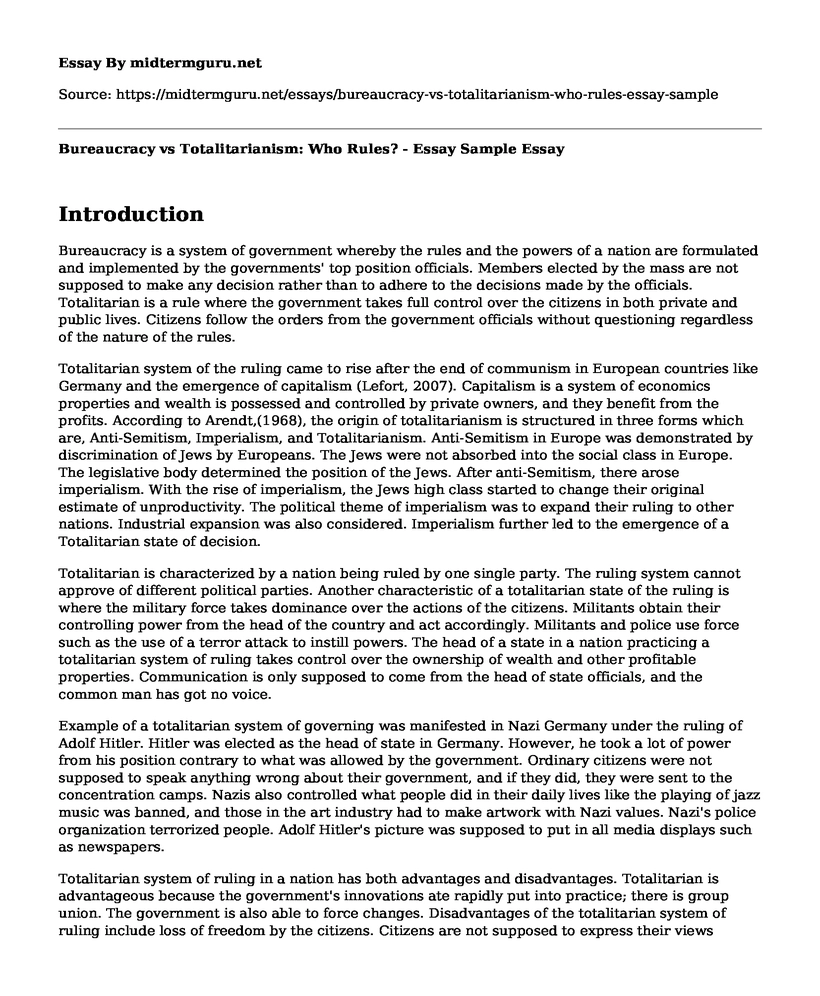Introduction
Bureaucracy is a system of government whereby the rules and the powers of a nation are formulated and implemented by the governments' top position officials. Members elected by the mass are not supposed to make any decision rather than to adhere to the decisions made by the officials. Totalitarian is a rule where the government takes full control over the citizens in both private and public lives. Citizens follow the orders from the government officials without questioning regardless of the nature of the rules.
Totalitarian system of the ruling came to rise after the end of communism in European countries like Germany and the emergence of capitalism (Lefort, 2007). Capitalism is a system of economics properties and wealth is possessed and controlled by private owners, and they benefit from the profits. According to Arendt,(1968), the origin of totalitarianism is structured in three forms which are, Anti-Semitism, Imperialism, and Totalitarianism. Anti-Semitism in Europe was demonstrated by discrimination of Jews by Europeans. The Jews were not absorbed into the social class in Europe. The legislative body determined the position of the Jews. After anti-Semitism, there arose imperialism. With the rise of imperialism, the Jews high class started to change their original estimate of unproductivity. The political theme of imperialism was to expand their ruling to other nations. Industrial expansion was also considered. Imperialism further led to the emergence of a Totalitarian state of decision.
Totalitarian is characterized by a nation being ruled by one single party. The ruling system cannot approve of different political parties. Another characteristic of a totalitarian state of the ruling is where the military force takes dominance over the actions of the citizens. Militants obtain their controlling power from the head of the country and act accordingly. Militants and police use force such as the use of a terror attack to instill powers. The head of a state in a nation practicing a totalitarian system of ruling takes control over the ownership of wealth and other profitable properties. Communication is only supposed to come from the head of state officials, and the common man has got no voice.
Example of a totalitarian system of governing was manifested in Nazi Germany under the ruling of Adolf Hitler. Hitler was elected as the head of state in Germany. However, he took a lot of power from his position contrary to what was allowed by the government. Ordinary citizens were not supposed to speak anything wrong about their government, and if they did, they were sent to the concentration camps. Nazis also controlled what people did in their daily lives like the playing of jazz music was banned, and those in the art industry had to make artwork with Nazi values. Nazi's police organization terrorized people. Adolf Hitler's picture was supposed to put in all media displays such as newspapers.
Totalitarian system of ruling in a nation has both advantages and disadvantages. Totalitarian is advantageous because the government's innovations ate rapidly put into practice; there is group union. The government is also able to force changes. Disadvantages of the totalitarian system of ruling include loss of freedom by the citizens. Citizens are not supposed to express their views regarding the government. Another problem is that it is expensive because there need of militants and equipment for spying purposes.
Conclusion
In conclusion, bureaucracy and totalitarianism are a form of ruling where the head of state officials formulate and implement the powers. Totalitarian originated from European countries like German. It took three forms anti-Semitism, imperialism and totalitarianism. German practiced dictatorship under the rule of Adolf Hitler. Tyranny is beneficial to the nation because the regulations are formulated and implemented very fast without wastage of time. However, fascism is disadvantages because it limits the freedom of citizens in expressing their views regarding the government. Totalitarian system of ruling is also expensive in terms of usage of resources.
References
Arendt, H. (1968). Origins of Totalitarianism. Houghton Mifflin Harcourt.
Claude, L. (2007). The concept of Totalitarianism. Columbia University Press
Cite this page
Bureaucracy vs Totalitarianism: Who Rules? - Essay Sample. (2023, Jan 03). Retrieved from https://midtermguru.com/essays/bureaucracy-vs-totalitarianism-who-rules-essay-sample
If you are the original author of this essay and no longer wish to have it published on the midtermguru.com website, please click below to request its removal:
- Three Canadian Legislation Act Paper Example
- Essay on Why We Talk
- Essay on President Hoover and George W Bush
- Social Context of the Society That Affects Many Parts of the World
- A Look at Healthcare Costs: Limiting Factors for Americans - Essay Sample
- Politics Role in the Socio-Economic Sectors of a Country - Essay Sample
- Effective Communication: Key to Successful Teaching & Learning - Essay Sample







